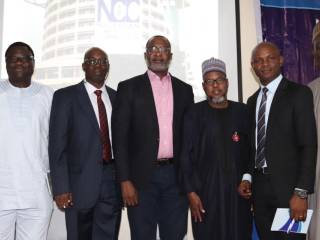The theme of the event was “Optimizing the Benefits of Telecoms Infrastructure in Nigeria” and present at the event were representatives of telecoms-interfacing MDAs of federal and state governments in the region.
Sunday Dare, the Executive Commissioner, Stakeholder Management, NCC, speaking through G.T. Mohammed, Deputy Director, Legal and Regulatory Services, NCC, said that the Stakeholders’ Parliaments in various regions were designed with three principal objectives in mind.
Mohammed said that “the three principal objectives of these engagements are; to reemphasize the immense benefits of ensuring the seamless operations of telecoms infrastructure; to better understand the peculiar telecoms-related issues that state MDAs are experiencing towards resolving them; and the third objective is to agree on a clear and actionable working plan for speeding up the deployment and protection of critical telecoms infrastructure”.
G.T. Mohammed stressed that the sealing up of of telecoms infrastructure, such as Base Transceiver Stations, by state MDAs leads to outages, service degradation, disruptions to communications, banking, health, and other platforms, causing the national economy to record huge losses that could amount to billions of Naira. “We must not let short-term revenue goals hamper our country’s ability to leverage technology for growth and development”, he said.
He, however, noted that previous engagements with stakeholders led to an agreement on six principles for ensuring the seamless operations of telecoms infrastructure:
1. Uniform Right of Way (RoW) rates and standardized review mechanisms applicable across all states.
2. Uniform approval processes and “One-stop-shop” agencies that will act as single interface for all site approvals and RoW within a state.
3. Dig-once policies to reduce cost of roll-out and protect roads and other public infrastructure.
4. “Zero-interference” commitments to ensure that legal due process will be observed and adequate notice given before any law enforcement action is taken against any service provider. Telecoms infrastructure must however never be tampered with.
5. SLAs with operators to ensure that issues are timeously resolved.
6. Escalation processes for all operator misconduct, as well as effective dispute resolution mechanisms.
Professor Abiola Sanni, a University of Lagos Professor of Commercial Law, while presenting a paper said that “other MDAs should follow the footsteps of the NCC which reviewed the license fees for Class Licences from Two Hundred and Fifty Thousand Naira (N250,000) to Ten Thousand Naira (N10,000) only”.
The secretary of the Association of Licensed Telecommunications Operators of Nigeria, Gbolahan Awoniga, speaking during the panel discussion at the event, appealed to states for understanding as operations in some states are subsidized with gains from other more viable states.
